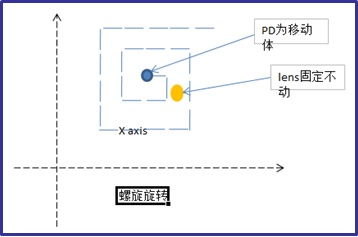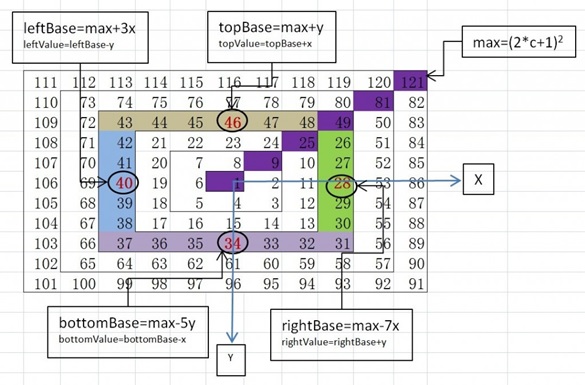Self-study C#07 from 0--Spiral queue and spiral motion
Spiral motion implementation based on spiral queue logic
The reverse method of the spiral queue algorithm controls the two-axis motor to move according to the spiral trajectory, as shown below.

#1. Spiral Queue Algorithm Analysis
The following figure is a spiral queue. Assume that the coordinates of 1 are (0, 0), the x direction is positive to the right, and the y direction is positive downward. For example, the coordinates of 7 are (-1, -1), and the coordinates of 2 are (1, 0). Programming allows you to input the coordinates (x, y) of any point and output the corresponding number! (Reprinted from the Internet)

Maximum value per circle max=(2*c+1)(2*c+1), c It is the number of turns from inside to outside.
The differences between these reference values and max are 1C (top), 3C (left), 5C (bottom), 7C (right) (C represents the current number of laps), on the top and bottom, y The coordinate represents (or is equal to) the number of circles (i.e. C=y), while on the left and right the x-coordinate represents (or is equal to) the number of circles (i.e. C=x). Therefore, the difference mentioned earlier can be expressed as 1y, 3x, 5y, 7x using coordinates.
Code implementation:
private static Object spiral(int x, int y)
{
int c = max(abs(x), abs(y));// 当前坐标所在圈
int max = (c * 2 + 1) * (c * 2 + 1);// 当前圈上最大值
if (y == -c) { // 上边
return max + (x + y);
} else if (x == -c) {// 左边
return max + (3 * x - y);
} else if (y == c) {// 下边
return max + (-x - 5 * y);
} else {// 右边
return max + (-7 * x + y);
}
}2. Spiral motion
First customize the coordinate operation to represent the logical position of the PD.
struct Coordinate
{ public int X; public int Y; public Coordinate(int a, int b)
{
X = a;
Y = b;
} public static bool operator ==(Coordinate loc1, Coordinate loc2)
{ return (loc1.X == loc2.X) && (loc1.Y == loc2.Y);
} public static bool operator !=(Coordinate loc1, Coordinate loc2)
{ return !(loc1 == loc2);
} public override bool Equals(object loc)
{ return this == (Coordinate)loc;
} public override int GetHashCode()
{ return base.GetHashCode();
} public static Coordinate operator -(Coordinate loc1, Coordinate loc2)
{ return new Coordinate(loc1.X - loc2.X, loc1.Y - loc2.Y);
} public static Coordinate operator +(Coordinate loc1, Coordinate loc2)
{ return new Coordinate(loc1.X + loc2.X, loc1.Y + loc2.Y);
} public override string ToString()
{ return "(" + X + "," + Y + ")";
}
}Then reverse the method and calculate the x and y coordinates based on the number of steps.
public Coordinate ToLocation(int step, int pulse)
{
int c = (int)Math.Ceiling((Math.Sqrt(step) - 1) / 2);
int max = (int)Math.Pow(2 * c + 1, 2);
int x, y;
y = -c;//top
x = -(max + y - step);
if (Math.Abs(x) <= Math.Abs(y))
{
this.location.X = x * pulse;
this.location.Y = y * pulse;
return this.location;
}
x = -c;//left
y = max + 3 * x - step;
if (Math.Abs(y) <= Math.Abs(x))
{
this.location.X = x * pulse;
this.location.Y = y * pulse;
return this.location;
}
y = c;//bottom
x = max - 5 * y - step;
if (Math.Abs(x) <= Math.Abs(y))
{
this.location.X = x * pulse;
this.location.Y = y * pulse;
return this.location;
}
x = c;//right
y = -(max - 7 * x - step);
this.location.X = x * pulse;
this.location.Y = y * pulse;
//LocChange();
return this.location;
}Finally, the movement is realized according to the change of coordinates.
public void Start()
{
Coordinate moveToLoc, currentLoc, deltaLoc;
currentLoc = ToLocation(1, 0);
logInfo = string.Format("{0}: {1}{2}.", DateTime.Now.ToString("HH:mm:ss"), "the start location is ", currentLoc.ToString());
log.SaveLogToTxt(logInfo);
logInfo = string.Format("{0}: {1}.", DateTime.Now.ToString("HH:mm:ss"), "begin to move... ");
log.SaveLogToTxt(logInfo);
for (int step = 1; step <= this.roMaxStep[0]; step++)
{
moveToLoc = ToLocation(step + 1, this.roPulse[0]);
deltaLoc = moveToLoc - currentLoc;
logInfo = string.Format("{0}: step{1}{2}{3}...", DateTime.Now.ToString("HH:mm:ss"), step + " ", "move to ", moveToLoc.ToString());
log.SaveLogToTxt(logInfo);
bool moveX = card.MoveX(deltaLoc.X);
bool moveY = card.MoveY(deltaLoc.Y);
if (moveX == false || moveY == false)
//throw error
return;
currentLoc = moveToLoc;
//if RES > RoRESTarget
//break;
}
logInfo = string.Format("{0}: {1}.", DateTime.Now.ToString("HH:mm:ss"), "move done");
log.SaveLogToTxt(logInfo);
logInfo = string.Format("{0}: {1}{2}.", DateTime.Now.ToString("HH:mm:ss"), "the current location is ", currentLoc.ToString());
log.SaveLogToTxt(logInfo);
}The above is the content of Self-Study C#07 from 0-Spiral Queue and Spiral Movement. For more related content, please pay attention to the PHP Chinese website (www.php.cn)!

Hot AI Tools

Undresser.AI Undress
AI-powered app for creating realistic nude photos

AI Clothes Remover
Online AI tool for removing clothes from photos.

Undress AI Tool
Undress images for free

Clothoff.io
AI clothes remover

Video Face Swap
Swap faces in any video effortlessly with our completely free AI face swap tool!

Hot Article

Hot Tools

Notepad++7.3.1
Easy-to-use and free code editor

SublimeText3 Chinese version
Chinese version, very easy to use

Zend Studio 13.0.1
Powerful PHP integrated development environment

Dreamweaver CS6
Visual web development tools

SublimeText3 Mac version
God-level code editing software (SublimeText3)

Hot Topics
 1663
1663
 14
14
 1420
1420
 52
52
 1313
1313
 25
25
 1266
1266
 29
29
 1239
1239
 24
24
 Active Directory with C#
Sep 03, 2024 pm 03:33 PM
Active Directory with C#
Sep 03, 2024 pm 03:33 PM
Guide to Active Directory with C#. Here we discuss the introduction and how Active Directory works in C# along with the syntax and example.
 Random Number Generator in C#
Sep 03, 2024 pm 03:34 PM
Random Number Generator in C#
Sep 03, 2024 pm 03:34 PM
Guide to Random Number Generator in C#. Here we discuss how Random Number Generator work, concept of pseudo-random and secure numbers.
 C# Data Grid View
Sep 03, 2024 pm 03:32 PM
C# Data Grid View
Sep 03, 2024 pm 03:32 PM
Guide to C# Data Grid View. Here we discuss the examples of how a data grid view can be loaded and exported from the SQL database or an excel file.
 Factorial in C#
Sep 03, 2024 pm 03:34 PM
Factorial in C#
Sep 03, 2024 pm 03:34 PM
Guide to Factorial in C#. Here we discuss the introduction to factorial in c# along with different examples and code implementation.
 The difference between multithreading and asynchronous c#
Apr 03, 2025 pm 02:57 PM
The difference between multithreading and asynchronous c#
Apr 03, 2025 pm 02:57 PM
The difference between multithreading and asynchronous is that multithreading executes multiple threads at the same time, while asynchronously performs operations without blocking the current thread. Multithreading is used for compute-intensive tasks, while asynchronously is used for user interaction. The advantage of multi-threading is to improve computing performance, while the advantage of asynchronous is to not block UI threads. Choosing multithreading or asynchronous depends on the nature of the task: Computation-intensive tasks use multithreading, tasks that interact with external resources and need to keep UI responsiveness use asynchronous.
 Patterns in C#
Sep 03, 2024 pm 03:33 PM
Patterns in C#
Sep 03, 2024 pm 03:33 PM
Guide to Patterns in C#. Here we discuss the introduction and top 3 types of Patterns in C# along with its examples and code implementation.
 Prime Numbers in C#
Sep 03, 2024 pm 03:35 PM
Prime Numbers in C#
Sep 03, 2024 pm 03:35 PM
Guide to Prime Numbers in C#. Here we discuss the introduction and examples of prime numbers in c# along with code implementation.
 How to change the format of xml
Apr 03, 2025 am 08:42 AM
How to change the format of xml
Apr 03, 2025 am 08:42 AM
There are several ways to modify XML formats: manually editing with a text editor such as Notepad; automatically formatting with online or desktop XML formatting tools such as XMLbeautifier; define conversion rules using XML conversion tools such as XSLT; or parse and operate using programming languages such as Python. Be careful when modifying and back up the original files.




